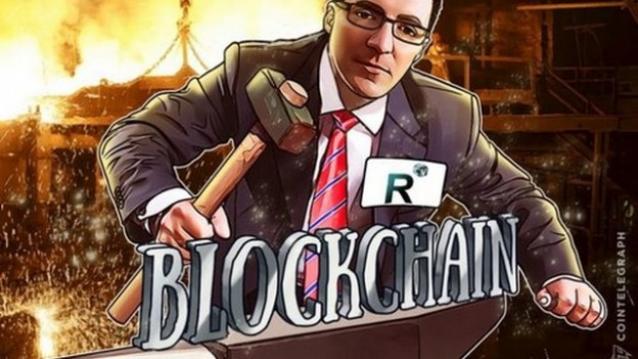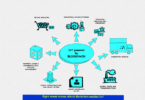If you have been following the news since the last couple of years, you must have noticed that there are two terms that have become part of daily tech parlance. Bitcoins and Blockchain. While the bitcoin pertains to crypto currency, it is the underlying technology driving it — Blockchain — which has potential to be used in various applications.
Blockchain is simply a peer to peer software technology that stores information across a network of computers. Blockchain is a distributed network, so there isn’t one central authority (such as banks) managing the transactions. This is done so as to prevent any one entity from taking down the entire network, in case it is corrupted. Blockchain uses cryptography to ensure that records cannot be duplicated or interchanged. There is an online system-wide account book called the distributed ledger which records every transaction happening between two entities and that record is stored chronologically and added to the blockchain. All parties in a secure network receive copies of the records of financial transactions. This means that the transactions do not have to be independently verified by third parties. To put it in perspective, blockchain has a record of anyone who has ever owned a bitcoin, since its inception.
Bitcoins are just one application which uses Blockchain technology, but it could also be used for online signature services, voting systems and other applications. We spoke to Scott Manuel, vice president, head of strategic product management for the applied innovation organisation at Thomson Reuters, on the importance of Blockchain in the Indian milieu. Here are the excerpts from that interaction.
Blockchain has become a catchphrase off late. How relevant do you think it is in the Indian context?
Absolutely. Blockchain is applicable to use cases regardless of geography, but sometimes those use cases are even stronger in certain geographies. Specific to India, could the immutable and distributed qualities of blockchain be applied to the land title management system, or mobile payments system, or the Aadhaar identity program. Potentially? The key is to understand the attributes of blockchain that you really need and want. Not just blindly implementing blockchain because you can. The value needs to be there.
What are the advantages Blockchain offers over other alternatives?
Generally, two aspects of blockchains are often desirable. 1) Immutability: the fact that information generally can’t be changed once it is on the blockchain. It is there to be audited or referenced for as long as the blockchain exists. 2) Distributed: the blockchain is fully replicated to each node on the network. Everyone has a copy and depending on the use case that can be a large benefit.
What are some of the areas, apart from bitcoin transactions, where Blockchain technology can be implemented without any hassles?
My previous answers are all focusing on non-bitcoin use cases too. Although the bitcoin currency created the initial excitement (good and bad excitement) in the market, the non-currency uses are where most of the commercial investment and exploration is focused. In financial services we see many test implementations using blockchain to help with post-trade settlement or recording proxy voting or private share registration. In tax and accounting we see tests with land title management.

What are the challenges that this technology will face in a highly regulated Indian framework?
Many countries have strong regulatory regimes like India. In those geographies the initial challenges are educating the regulators about the opportunity and then partnering with the regulator with the solution. It will never work to just build a solution in isolation and “throw it over the wall” for regulators to either approve or reject. For new complex technology like this it requires collaboration and education.
Unlike China, in India bitcoins and in effect crypto-currency is not looked at with as much interest. For instance bitcoin miners in China get special waivers. How long before Indian govt understands the importance of this future of currency?
My specialty isn’t currency. They one thing I would say is that countries with well-developed financial systems and stable currencies are not seeing a huge shift to bitcoin or other crypto-currencies. In these situations it is so much easier to just use and spend the established national currency. In parts of the world where this isn’t the case we have seen bitcoin grow in adoption relatively quickly. Parts of Africa fit that latter category.
How does Blockchain tie in with digital identity? What are the benefits?
Out of the box blockchain does not solve identity. Identity is a complex, multi-faceted issue. However, blockchain could (emphasis on could) prove to be a technology that helps with the implementation of a robust digital identity system. It goes back to the distributed and immutable qualities I mentioned earlier.
Considering India is implementing Aadhaar-based authentication in every aspect, do you see any intersection of paths between Aadhaar and Blockchain?
Perhaps. To my knowledge the existing Aadhaar implementation does not leverage blockchain technology. However, it doesn’t mean that blockchain couldn’t be leveraged for new products and services that rely on Aadhaar or built into future versions of Aadhaar itself. The key is that blockchain brings new value to those enhancements.
What are some of the cybersecurity challenges that we are looking at, as we move towards an increasingly cashless economy?
Cybersecurity is a key concern with every move the world is making towards digital-based products and services including payments. It is a constant race to build stronger systems which are more resilient to cyber threats which grow in strength every day as well. I think the industry has a come a long way in recognising the strength of the threat and understanding that people have to be confident in the security of the system (payments or otherwise) or they won’t adopt the system. The shift of energy and resources toward cybersecurity will only continue as the assets you are protecting become more valuable. No system is perfectly secure so this race will go on and on.









